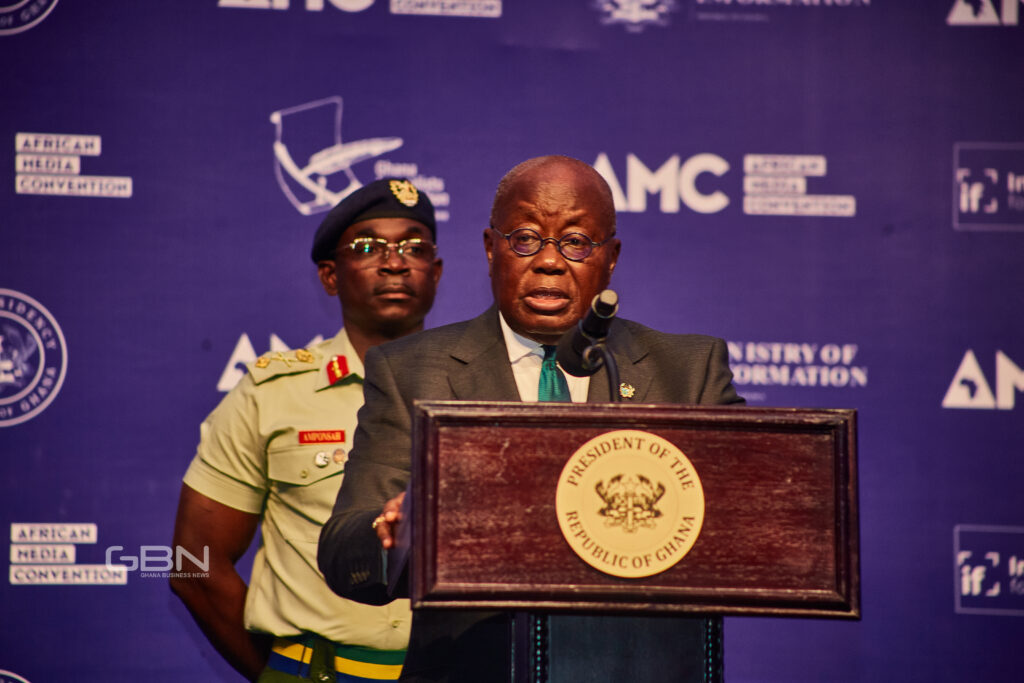We will find the killers of Hussein-Suale – Akufo-Addo

The President of Ghana has said again that the authorities will find the killers of Ahmed Hussein-Suale Divela and bring them to justice, no matter how long it took.
President Nana Addo-Dankwa Akufo-Addo said this at the closing of the Third African Media Convention (AMC) in Accra May 17, 2024. However, it appeared the remarks were not part of the president’s original written speech as he said so after he concluded his speech and the audience had clapped. He appeared to have reacted to the call by the President of The African Editors Forum (TAEF), Churchill Otieno. Otieno made the call for the killers of Hussein-Suale to be brought to book in his speech earlier as the AMC drew to a close.
Hussein-Suale was killed by two gun-wielding men on January 16, 2019, five years ago.
The cold-blooded murder of Hussein-Suale was carried close to his home in Madina, Accra. The unknown men have since not been found, and there is hardly any official briefing from the authorities about progress or otherwise on the investigations and efforts to find the killers.
Hussein-Suale had received death threats in the past for his work. Working closely with Anas Aremeyaw Anas, one of Ghana and Africa’s remarkable investigative journalists, they have done some important work that threw light on many bad guys, some of them close to powerful political actors.
The cowardly murder of Hussein-Suale followed in the heels of the broadcast of Number 12, an investigative documentary that revealed the stinky rot in Ghana football. Caught in the web were the then Ghana Football Association Chairman, Kwasi Nyantakyi, some football administrators and referees. Most of whom have been dismissed.
Among other things, the President lauded the success of the Fourth Republic which he described as “most enduring and most successful of the country’s four Republics.” The other periods of the Republican experiment were truncated by military coups. He emphasized on the system of government that promotes separation of powers and accountable governance grounded in a constitution.
“Though the Constitution of the Fourth Republic guarantees freedom of expression, including the freedom of the press and other media, as fundamental human rights, and makes elaborate provisions to protect the freedom and independence of the media, the existing laws which continued in force, by the same constitution, contained colonial laws on our statute books that were manifestly anti-libertarian and repressive of free expression,” he said.
President Akufo-Addo pointed out the fact that he led the process as Attorney-General under President John Kufour to repeal the criminal libel law.
“The repeal which happened on the 27th of January 2001, was a very happy day for me,” he said to applause from the gathering.
He noted that the repeal of that law has had a very positive impact on the development of the Ghanaian media, freeing it from unnecessary self-censorship, and advancing a robust and critical media culture.
“The process has contributed to the growth of our vibrant media and has won Ghana the reputation of having one of the most media friendly and liberal climates on the continent,” he said.
According to the President, that has also contributed to the deepening of democracy in Ghana and strengthened accountability as a strategic goal of public policy.
The President further pointed out that he saw to the enactment of the Right to Information Act 2019, Act 989. “An Act which successive governments could not pass for lack of the political will to do so,” he said.
“The Act’s passage is a milestone in our democratic journey, providing citizens and the media with the essential tools to contribute to more open and accountable government,” he said.
He also indicated that media freedom has empowered journalists, improved the quality of reporting and fostered a culture of transparency that benefits the entire society.
The President further noted that as a result of the freedom, Ghanaian citizens are able to boldly and freely express their views and give feedback on policies and programmes of government, and civil society organisations are able to interrogate fearlessly, government policies and positions, and offer critic and suggestions to complement the efforts of government.
“And the political opposition is able to raise dissent openly, canvass alternative viewpoints, and by so doing, offer our citizens alternatives to consider,” he said.
In his remarks closing @amcghana2024, Ghanaian President @NAkufoAddo repeated a commitment to holding accountable the killers of journalist Ahmed Hussein-Suale Divela.
CPJ welcomes mention of the case and calls for authorities in #Ghana to match words with action and… https://t.co/Ix7j1dkhpa
— CPJ Africa (@CPJAfrica) May 17, 2024
Meanwhile, the Committee to Protect Journalists (CPJ) has welcomed the Ghana government’s commitment to hold accountable the killers of Hussein-Suale. The organization said on X, formerly Twitter: “In his closing remarks, Ghanaian President, Nana Akufo-Addo repeated a commitment to holding accountable the killers of journalist Ahmed Hussein-Suale Divela. CPJ welcomes mention of the case and calls for authorities in Ghana to match words with action and transparency. Over five years since the murder, who are the current suspects and what is the status of the investigation?”
By Emmanuel K Dogbevi
Copyright ©2024 by NewsBridge Africa
All rights reserved. This article or any portion thereof may not be reproduced or used in any manner whatsoever without the express written permission of the publisher except for the use of brief quotations in reviews.
